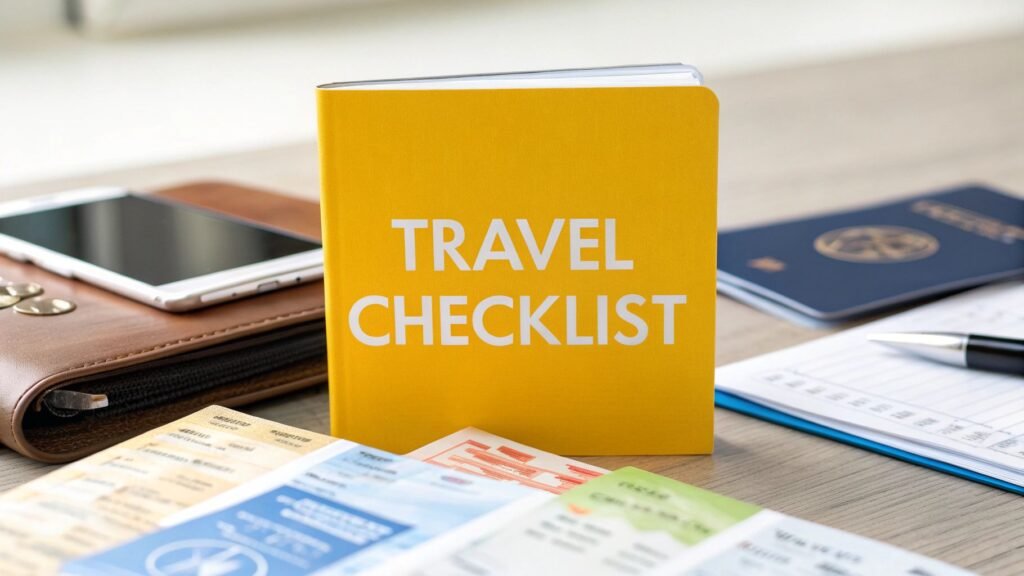Embarking on an adventure, whether it's a self-drive tour through the Scottish Highlands or a cultural exploration of Italy, begins long before you reach the airport. The secret to a seamless and stress-free journey lies in meticulous preparation, and at the heart of that is having all your essential documents meticulously organised. Overlooking a single piece of paper can lead to unnecessary delays, missed connections, or in the worst-case scenario, a cancelled trip.
This comprehensive travel document checklist is designed to eliminate that risk entirely. We will guide you through every critical document you need, from passports and visas to digital confirmations and health records. Our focus is on providing practical, actionable advice to ensure you're perfectly prepared for any eventuality.
Think of this as your definitive guide to starting your holiday with complete confidence and peace of mind. We will break down what you need, why it matters, and how to keep it all secure, so you can focus on the exciting parts of your journey. By following this checklist, you ensure that the administrative details are handled, leaving you free to immerse yourself in the landscapes, history, and culture of your destination.
1. Valid Passport
A valid passport is the cornerstone of any international travel document checklist, acting as your official government-issued identification and proof of citizenship. This single document is your key to crossing borders, checking into flights, and verifying your identity in a foreign country. Without it, your international travel plans will stop before they even begin, making its validity and condition paramount.
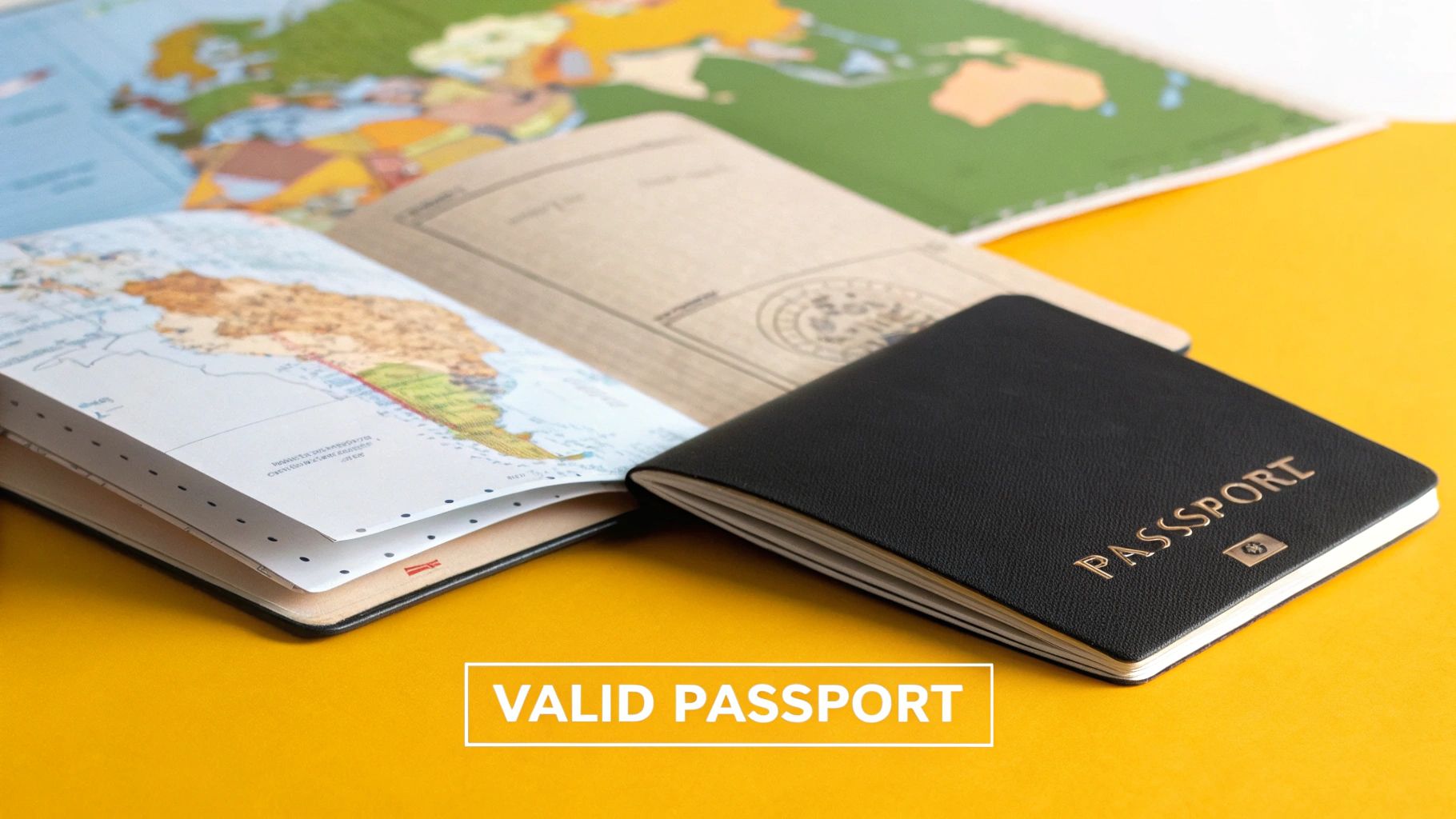
Many travellers are caught out by the "six-month validity rule". This is a common entry requirement for many countries, stating that your passport must be valid for at least six months from your planned date of departure from that country. Failing to meet this can result in being denied boarding at the airport or turned away at immigration upon arrival.
Key Passport Checks and Actions
Before you even book a flight, it's crucial to physically check your passport. Look for the expiration date and assess the overall condition. Any significant damage, such as a torn data page or water damage, could render it invalid.
Here are some essential actions to take well in advance of your trip:
- Check the Expiry Date: Verify your passport’s expiry date at least 9-12 months before any planned international travel. This gives you ample time for a standard renewal process, which can often take several weeks or even months.
- Verify Page Count: Ensure you have enough blank pages for entry and exit stamps. Some countries require at least two blank pages, and frequent travellers can run out surprisingly quickly.
- Create Digital and Physical Copies: Make high-quality colour photocopies of your passport's data page. Store one copy in your checked luggage and another with a trusted person at home. Also, save a secure digital copy to a cloud service or your email for emergency access.
Expert Tip: For British citizens, a standard passport renewal can be completed online via the HM Passport Office website. If your travel is imminent, you may need to use the Online Premium or 1-week Fast Track service for an additional fee to guarantee a quicker turnaround. This is a vital option if you discover an issue close to your departure date.
2. Travel Visa
Beyond your passport, a travel visa is often the most critical entry requirement, acting as an official endorsement from a foreign government that allows you to enter, stay, or transit through their country. This document, which can be a stamp in your passport or a separate electronic record, specifies the purpose and duration of your visit. Overlooking visa requirements is a common and costly mistake that can halt your travel plans at the check-in desk.
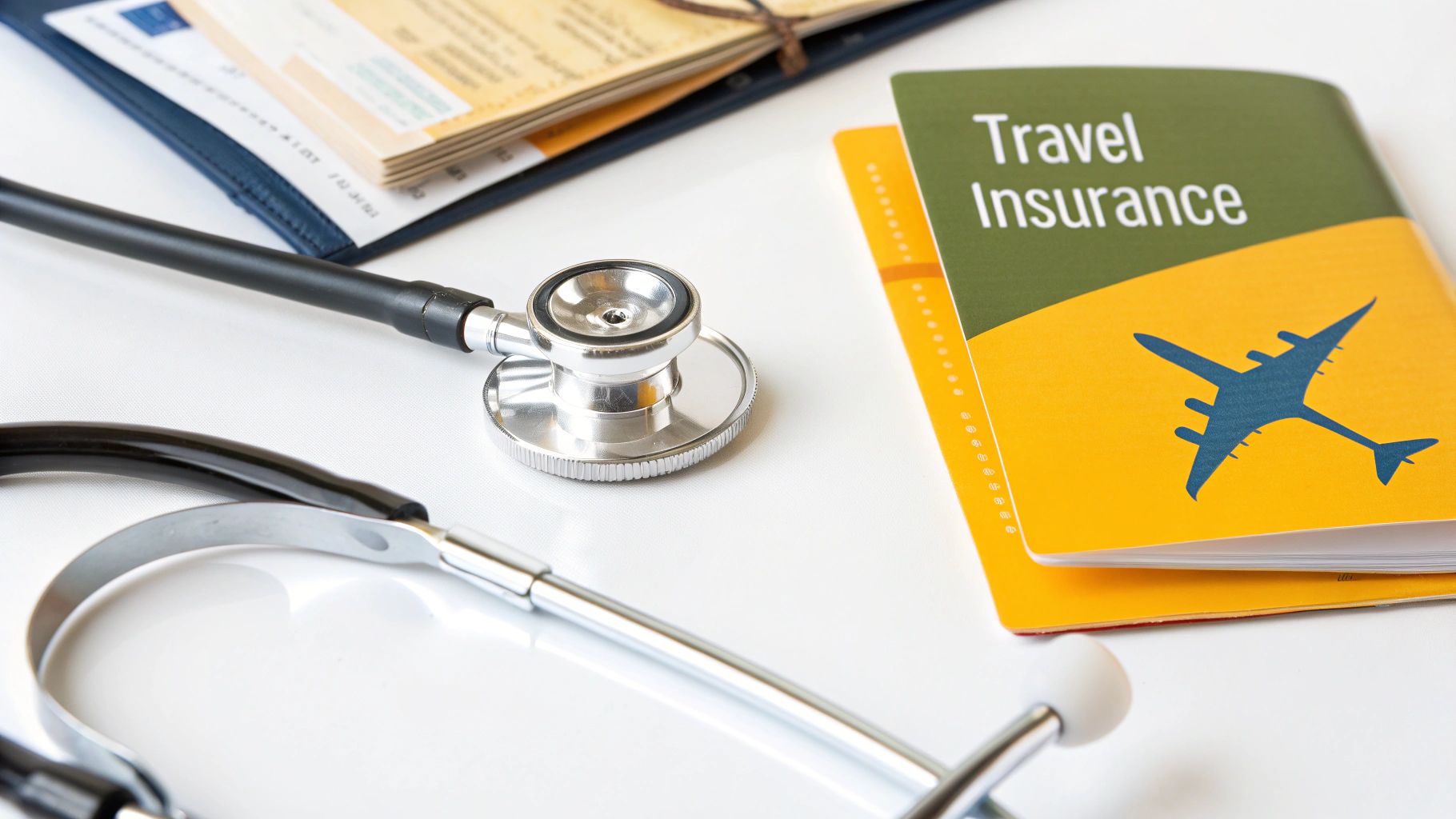
Visa rules are complex and vary dramatically based on your citizenship and your destination. For instance, a UK citizen can travel visa-free throughout the Schengen Area for up to 90 days, but would need to apply in advance for a tourist visa to visit China. Understanding these specific requirements for every country on your itinerary is an indispensable part of preparing your travel document checklist.
Key Visa Checks and Actions
The first step in your travel planning should be to research the visa requirements for your destination. This should be done months in advance, as application processes can be lengthy and require extensive documentation, such as proof of funds, flight itineraries, and accommodation bookings.
Here are some essential actions to take well before your departure:
- Research Requirements Early: As soon as you decide on a destination, use its official embassy or consulate website to check the specific visa requirements for your nationality. This will prevent last-minute surprises and rushes.
- Gather Supporting Documents: Visa applications often require a host of documents. Common requests include passport photos with specific dimensions, bank statements, employment letters, and travel insurance details. Organise these carefully before you begin the application.
- Note Application Timelines: Processing times can range from a few days for an e-visa (like India's) to several weeks or months for more complex applications. Apply at least 2-3 months before your trip to allow for any potential delays.
Expert Tip: Always use the official government website or an authorised visa application centre for your application. Third-party websites may charge exorbitant fees or provide outdated information. For trips involving multiple countries, such as a tour of Southeast Asia, remember to check the visa rules for each individual nation, as they can differ significantly even for neighbouring countries.
3. Travel Insurance Policy
While not a government-issued document for entry, a comprehensive travel insurance policy is one of the most critical items on any travel document checklist. It acts as your financial safety net, protecting you from a wide range of unforeseen events such as medical emergencies, trip cancellations, lost baggage, and travel disruptions. Without it, a sudden illness or accident abroad could lead to devastating medical bills, making it an indispensable part of responsible travel planning.
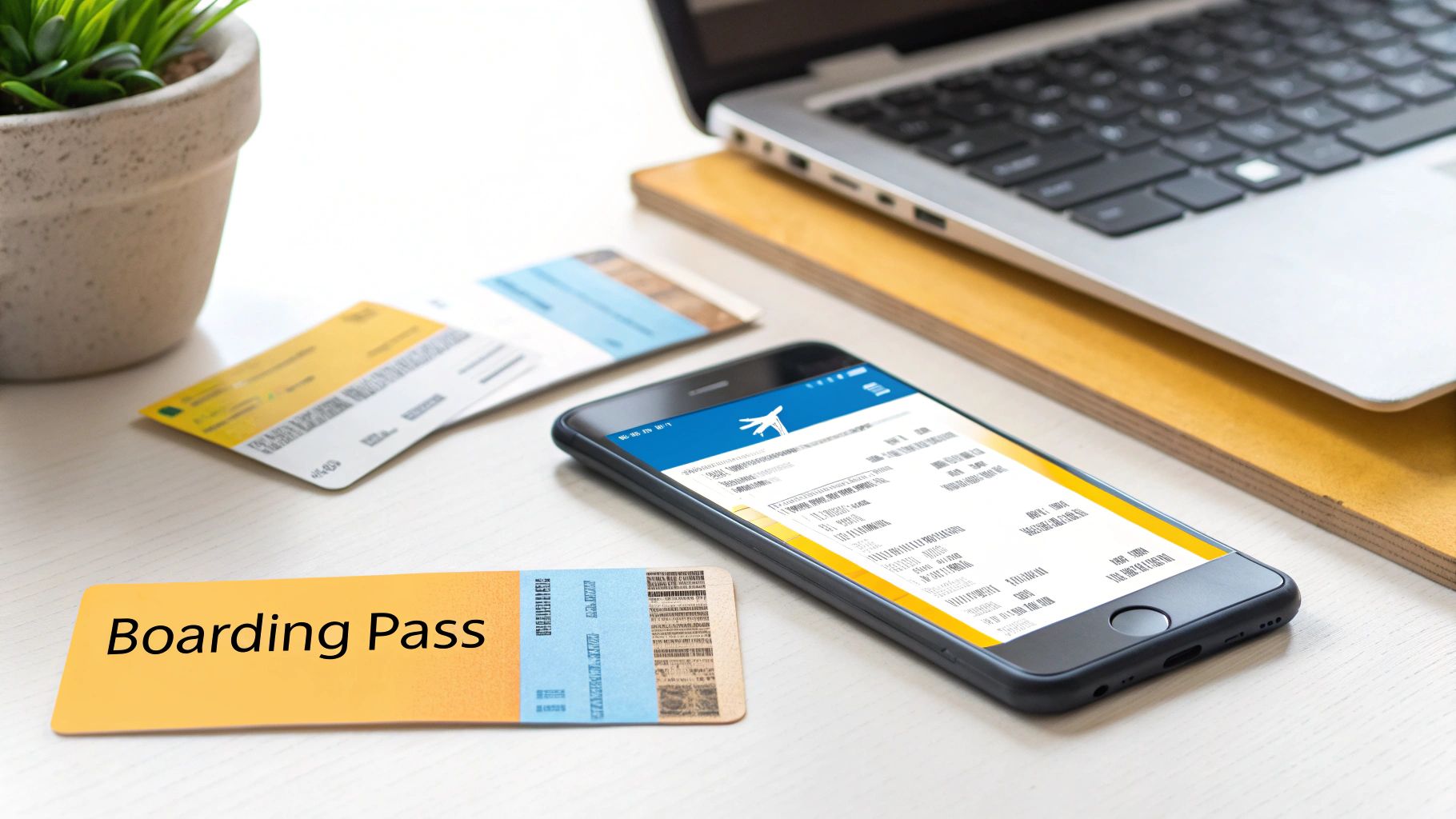
For many destinations, travel insurance is not just recommended, it's a mandatory requirement for entry. For example, travellers applying for a visa to the Schengen Area in Europe must show proof of medical insurance with a minimum coverage of €30,000. This highlights its importance not just for peace of mind, but as a formal prerequisite for your journey.
Key Insurance Checks and Actions
Before you depart, it is crucial to understand the specifics of your policy and have the necessary documentation readily accessible. A policy is only useful if you know what it covers and how to use it in an emergency.
Here are some essential actions to take after purchasing your policy:
- Read the Policy Wording: Carefully review the Policy Disclosure Statement (PDS) to understand exactly what is and isn't covered. Pay close attention to exclusions, especially regarding pre-existing medical conditions and specific activities like adventure sports.
- Print and Save Your Documents: Print a physical copy of your insurance certificate and the emergency contact card. Store this with your other important documents. Also, save a digital PDF copy to your phone, email, or a cloud storage service for easy access.
- Purchase Promptly: To be eligible for benefits like cancellation cover for unforeseen events before your trip, it's wise to purchase your policy as soon as you make your first major trip payment, such as booking flights or accommodation.
Expert Tip: For UK travellers who take several trips a year, an annual multi-trip policy often provides better value than purchasing separate policies for each journey. This saves time and administration, ensuring you are continuously covered for both long holidays and spontaneous weekend breaks. Always check that the per-trip duration limit meets your travel needs.
4. Flight Tickets and Boarding Passes
Your flight ticket is the official confirmation of your itinerary and contract with the airline, while your boarding pass is the crucial document granting you access to the aircraft. While they are intrinsically linked, they serve different purposes at different stages of your journey. In today's digital age, these are often electronic, but understanding how to manage them is a vital part of any comprehensive travel document checklist.
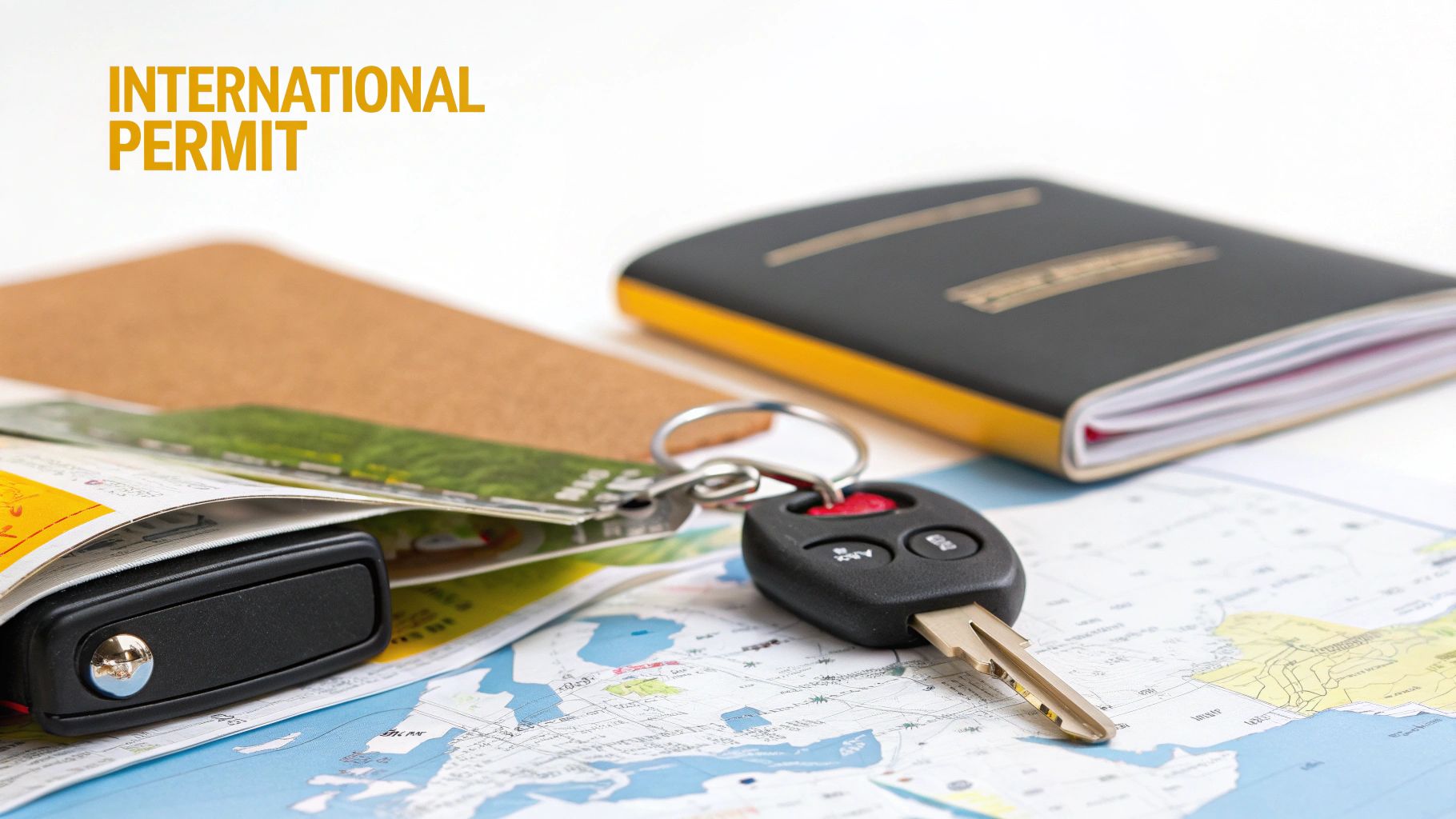
Many airlines, like Delta, offer user-friendly mobile apps that allow you to check in, receive your boarding pass, and store it directly in your phone's digital wallet. However, it’s a mistake to rely solely on digital versions. Some international destinations may require printed proof of an onward or return ticket for visa verification, and some low-cost European carriers, like Ryanair, are known to charge a hefty fee if you need them to print your boarding pass at the airport.
Key Ticket and Boarding Pass Checks and Actions
Before heading to the airport, ensure you have easy access to your flight details and have completed the check-in process. A small amount of digital and physical organisation can prevent significant stress on your travel day.
Here are some essential actions to take after booking and before flying:
- Download and Prepare Digitally: Install the airline's official app and enable push notifications for real-time updates on gate changes, delays, or cancellations. Once you've checked in, save a screenshot or PDF version of your boarding pass to your device so it's accessible offline.
- Print Physical Backups: Always print a hard copy of your flight confirmation and your boarding pass, especially for long-haul international travel. Keep these in your hand luggage, separate from your phone. This backup is invaluable if your phone battery dies or you face a technical glitch.
- Verify All Details: Double-check that the name on your ticket and boarding pass exactly matches the name on your passport. Even a minor discrepancy can cause issues at security or the boarding gate.
Expert Tip: If travelling with a group or family, organise all boarding passes (both digital and physical) in one accessible place. For digital versions, take screenshots and save them to a shared photo album. For paper copies, use a travel wallet or a simple plastic folder to keep them together and prevent them from getting lost or damaged.
5. Driver's License or International Driving Permit
For travellers planning to get behind the wheel, a standard UK driver's license may not be sufficient. An International Driving Permit (IDP) is a crucial addition to your travel document checklist, acting as a multi-language translation of your existing license. It is legally required in over 140 countries and is often an non-negotiable prerequisite for renting a vehicle abroad.
While your photocard license is valid in EU countries, many other popular destinations, including Japan and the USA, often require an IDP. For example, some US car rental companies will refuse service without one, and in Japan, it's mandatory for all foreign drivers. An IDP standardises your driving credentials, making them easily understandable for foreign authorities and rental agencies, preventing potential legal issues or holiday disruptions.
Key IDP Checks and Actions
Before embarking on a road trip, you must verify the specific requirements of the country you're visiting. Different countries require different versions of the IDP (1949 or 1968 conventions), so applying for the correct one is essential.
Here are some essential actions to take well in advance of your trip:
- Identify the Correct IDP: Visit the Post Office or Gov.uk website to determine which permit type is needed for your destination. Some countries require both, while others may have unique bilateral agreements.
- Apply in Good Time: Although IDPs can often be obtained over the counter at participating Post Office branches, it’s wise to secure it several weeks before you travel. You will need your valid UK driving license, a passport-sized photo, and the application fee.
- Always Carry Both Documents: An IDP is only valid when presented alongside your actual UK driving license. You must carry both documents with you at all times when driving abroad to avoid fines or other penalties.
Expert Tip: In the United Kingdom, IDPs are issued exclusively by the Post Office. Be wary of unofficial websites offering online services for a high fee, as these are often scams and the documents they provide are not legally recognised. Always use the official channel to ensure your permit is genuine and valid.
6. Hotel Reservations and Accommodation Confirmations
While your passport gets you across the border, your accommodation confirmations prove you have a legitimate plan once you arrive. These documents serve as official proof of your intended stay and are often a crucial component of a successful visa application or a smooth entry through immigration, demonstrating your organised travel itinerary and financial preparedness. For many border officials, it's a key part of verifying you are a genuine tourist.
This requirement is not just a formality. For destinations like the Schengen Area, visa applicants must provide detailed, day-by-day proof of accommodation for their entire trip. Without this, an application can be swiftly rejected. Similarly, immigration officers in countries like Japan or the USA may ask to see proof of where you are staying for the first few nights as part of their entry assessment.
Key Confirmation Checks and Actions
Before you travel, it is essential to gather and organise all your accommodation paperwork. This includes bookings made through large platforms like Booking.com, direct hotel confirmations, or even private rental agreements from services like Airbnb.
Here are some essential actions to take to ensure you are fully prepared:
- Print and Save Offline Copies: Do not rely solely on your mobile phone or an internet connection. Print physical copies of every confirmation email and save digital PDF versions to an offline folder on your devices.
- Verify Booking Details: Double-check the check-in/check-out dates, address, and hotel contact number. Cross-reference the location on a map to ensure it matches your plans and is easily accessible upon arrival.
- Understand Your Rate Type: Note whether your booking is refundable or non-refundable. Booking a flexible, refundable rate can be a strategic move during the visa application process, allowing you to change plans later without financial penalty.
- Keep Customer Service Details: For bookings made via a third-party platform, have their customer service number readily available. If there is an issue with your reservation upon arrival, you will need to contact them directly.
Expert Tip: When organising your travel document checklist, create a specific folder for accommodation. Arrange the printed confirmations chronologically according to your itinerary. This makes it incredibly easy to present the correct document to an immigration official without fumbling through a disorganised stack of papers, projecting confidence and preparedness.
7. Health Documents (Vaccination Records, Medical Prescriptions)
Health-related documents have become a crucial part of any comprehensive travel document checklist, serving as proof of necessary immunisations and authorisation for essential medications. Certain countries mandate specific vaccinations for entry, while others have strict regulations on carrying prescription drugs. Having the correct paperwork organised ensures you meet health requirements and can manage your wellbeing abroad without interruption.
Many destinations, particularly in parts of Africa and South America, require proof of a Yellow Fever vaccination to grant entry. In the post-pandemic era, COVID-19 vaccination certificates or proof of recovery may also be necessary depending on your destination's rules. Furthermore, travelling with medication, especially controlled substances, without proper documentation can lead to confiscation or serious legal issues.
Key Health Document Checks and Actions
Well before your departure, you must research the specific health requirements of your destination and organise your medical documents accordingly. This process often begins 6-8 weeks before you travel, as some vaccination courses require multiple doses.
Here are some essential actions to take well in advance of your trip:
- Consult a Travel Clinic: Visit your GP or a specialised travel clinic to discuss your itinerary. They can advise on required and recommended vaccinations, provide necessary prescriptions, and issue official documentation like an International Certificate of Vaccination or Prophylaxis (ICVP).
- Organise Prescriptions: Carry all medications in their original, clearly labelled packaging. Obtain a letter from your doctor detailing your condition, the medication prescribed (using its generic name), and the dosage. This is especially vital for controlled drugs or liquid medications exceeding 100ml.
- Research Medication Legality: Verify that your prescription medication is legal in your destination country. Some common over-the-counter or prescription drugs in the UK are considered controlled substances elsewhere. Check with the embassy of the country you plan to visit for definitive guidance.
Expert Tip: Always carry your health documents and essential medications in your hand luggage, never in your checked bags. Beyond specific prescriptions and vaccination records, understanding the broader importance of preventive healthcare can help ensure you stay healthy and prepared for your journeys.
Travel Document Checklist Comparison
| Item | Implementation Complexity | Resource Requirements | Expected Outcomes | Ideal Use Cases | Key Advantages |
|---|---|---|---|---|---|
| Valid Passport | Moderate (application, biometrics) | Government agencies, fees, photos | Official ID, proof of citizenship, travel document | International travel, ID verification | Universally accepted, consular protection |
| Travel Visa | High (application, documentation) | Embassy/consulate, fees, paperwork | Legal entry permission with specified conditions | Entry to countries requiring authorization | Enables legal access, multiple visa types available |
| Travel Insurance Policy | Moderate (policy selection, claims) | Insurance providers, premium payments | Financial protection against travel risks | International trips, high-risk travel | Covers medical emergencies, trip cancellation |
| Flight Tickets and Boarding Passes | Low (booking, app usage) | Airlines, mobile apps or printouts | Proof of travel contract and boarding access | Air travel | Digital convenience, real-time updates |
| Driver's License or International Driving Permit | Moderate (application before travel) | Licensing agencies, valid domestic license | Legal driving abroad, ID translation | Driving in foreign countries | Legal driving, multi-language ID, low cost |
| Hotel Reservations and Confirmations | Low (booking online or agents) | Booking platforms, payments | Proof of accommodation for visa and travel | Visa applications, travel plans | Required for visas, conflict resolution support |
| Health Documents (Vaccinations, Prescriptions) | Moderate (medical visits, documentation) | Healthcare providers, vaccines, prescriptions | Compliance with health regulations, medication access | Travel to countries with health requirements | Ensures health compliance, emergency medical info |
Ready for Take-Off: Final Checks for Flawless Travel
Navigating the complexities of travel preparation can often feel like the most daunting part of the journey. Yet, by methodically working through this comprehensive travel document checklist, you have built a powerful foundation for a seamless and stress-free adventure. You’ve moved beyond simply collecting papers; you've created a strategic toolkit designed to handle any eventuality, from border crossings to unexpected diversions.
This process transforms potential chaos into controlled confidence. Your passport is valid, your visa is secured, and your travel insurance policy is ready to act as your safety net. Flight tickets, accommodation confirmations, and your driver's license are organised and accessible, while crucial health documents are prepared for any necessary verification. You have turned a list of requirements into a personalised system for peace of mind.
Key Takeaways for Your Journey
The true value of this checklist lies not just in what you’ve gathered, but in how you’ve organised it. Let's recap the most critical strategies that elevate your preparation from good to flawless:
- The Power of Redundancy: The single most important habit is to create both digital and physical copies of every document. Store digital versions in a secure cloud service (like Google Drive or Dropbox) and keep physical photocopies in a bag separate from the originals. This simple action is your best defence against loss or theft.
- Share Your Plans: Always leave a copy of your full itinerary, along with digital copies of your key documents, with a trusted friend or family member back home. This ensures someone can assist you in an emergency, no matter where you are in the world.
- Pre-Flight Document Review: Schedule a final check of all your documents 24-48 hours before you leave for the airport. Cross-reference names on tickets and passports, confirm reservation dates, and ensure your digital copies are easily accessible on your phone.
Mastering this level of organisation does more than just prevent logistical headaches. It frees up your mental energy, allowing you to fully immerse yourself in the experience ahead. Instead of worrying about a missing confirmation email or an expiring passport, you can focus on the historic sites, breathtaking landscapes, and rich cultural encounters that await. This diligent preparation is the invisible framework that supports the most memorable adventures, empowering you to explore with absolute confidence. You are no longer just a tourist with a ticket; you are a well-prepared traveller ready to discover.
Ready to put your perfectly organised documents to use on an expertly crafted journey? The team at BTOURS specialises in creating bespoke self-drive holidays and cultural tours where every detail is managed for you, letting you focus solely on the adventure. Explore our unique itineraries at BTOURS and discover how effortless travel can be.

